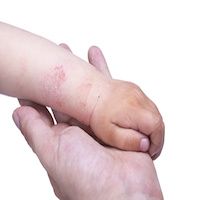Year-End Reviews Mark Advances Against Atopic Eczema
An end-of-year two-part review highlighted that despite prevalent outcome measures, there is no consensus on the definition of a flare in atopic dermatitis.

An end-of-year, two-part review addressing progress in atopic eczema/dermatitis (AD) highlighted that despite prevalent outcome measures, there is no consensus on the definition of a flare in AD.
Kim Thomas, PhD, professor of Applied Dermatology Research and co-director of the Centre of Evidence Based Dermatology, University of Nottingham, United Kingdom and colleagues summarized findings from recent systematic reviews; examining epidemiology, risk factors, and outcomes in part I.
Birth weight had associations with development of AD, with indications that high birth weight (above 4000gm) could be associated with increased risk and low birth weight (below 2500gm) with reduced risk relative to average birth weight.
Researchers scrutinized a long-standing association of increased incidence of AD in higher socioeconomic groups, along with rates of asthma and allergic diseases. While AD and allergies appeared more prevalent among higher socioeconomic groups, asthma was associated with lower socioeconomic position. Experts suspected exposure to traffic-related air pollution to be a factor in the latter association, while its relation to AD, if any, remains unclear, since the results of three studies on this question were contradictory.
According to Thomas and colleagues, genotyping has become increasingly important in uncovering risk as well as identifying potential targets for treatment. "The impact of a single nucleotide polymorphism (SNP) on phenotype may lead to improved understanding of the differential response that patients exhibit to treatments."
The reviewers offered one example from many, in the studies of interleukin-18 polymorphisms. Although the pooled results held no significant association with allergies, subgroup analyses pointed to possible protective effects on developing AD.
There continues to be consensus on the need to maintain long-term treatment of AD after obtaining remission of flares. In addition, relapse was found more likely in long-term follow-up studies when there had been incomplete remissions.
The reviewers noted; however, that there is no consensus on the benefit of treating subclinical inflammation in normal-appearing skin. "Further studies are required to establish whether such a strategy carries any prognostic benefits," Thomas and colleagues remarked.
Among the many measures of AD symptom severity, the Harmonizing Outcome Measures for Eczema (HOME) initiative preferred the Eczema Area Severity Index (EASI). Thomas and colleagues explained that although AD flares are a common outcome measure in clinical trials, there is no standardized definition, which has limited the capacity to interpret and compare trials.
The reviewers found that 26 studies contained 22 different definition of an AD flare. The definitions varied widely, and all were without validation. Most; however, were based on patients' perceptions of worsening AD symptoms.
"Capturing such data in a feasible, reliable, and valid way remains a challenge," Thomas and colleagues remark.
The reviews by Thomas and colleagues, “What’s New in Atopic Eczema? An analysis of Systematic reviews published in 2014. Part 1. Epidemiology, Risk Factors and Outcomes” were published in the December issue of Clinical and Experimental Dermatology. Their findings in part II on treatment and prevention are reported separately.
Related Coverage:
Genotyping Promises Precision Treatment of Atopic Eczema